
Want To Make LibreOffice In Ubuntu Rock? Want a Job?
The Ubuntu Desktop Team are looking for an engineer to make [LibreOffice](https://www.documentfoundation.org/download/) rock in Ubuntu. The role is described as:
> We are seeking a Software Engineer to play a key development and integration role on the Ubuntu Desktop Team – one of the technical teams that makes up the Ubuntu Platform Team. As part of the core Ubuntu team, the Engineer will work on a broad range of technical tasks: including feature planning, packaging, integration,bug-fixing and maintenance. The successful candidate will ensure a first class user experience by envisioning new desktop integration features for office productivity, packaging, desktop integration, bug fixing and development of office productivity related software such as Open Office. Strong communication and relationship skills are as important as superb technical skills in this role, as the successful candidate will be responsible for process communication and coordination between Ubuntu and external partners, as well as ensuring commonality of purpose and technical approach. This job involves international travel several times a year, usually for one week.
The Desktop Team is awesome team to join at Canonical, and if you would like to ensure the office productivity experience in Ubuntu is rocking, be sure to [check out the job description](https://webapps.ubuntu.com/employment/canonical_UP-SE-RS2/) and apply if you think you would be right for the role.
I am just sending the message on, so don’t ask me queries about the role – feel free to ask the hiring manager, Jason Warner, who is `jasoncwarner` on `#ubuntu-desktop` on freenode IRC.
Good luck!
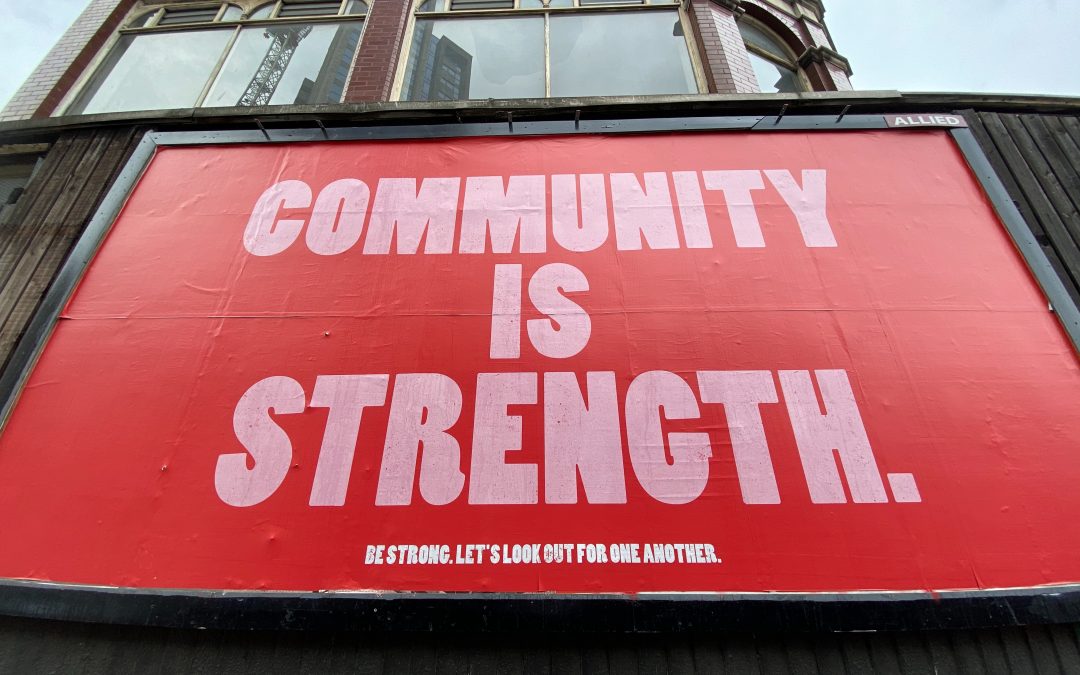
Reasons Why I Love My Desktop
I remember when I first got involved in Linux and Free Software, the Linux desktop was a pretty ugly place. Much of the reason for this was that getting a graphical display running was in itself a bit of a luxury, and one earned with lots of config file hacking and poking. When you did manage to get it up and running it looked a little like this:
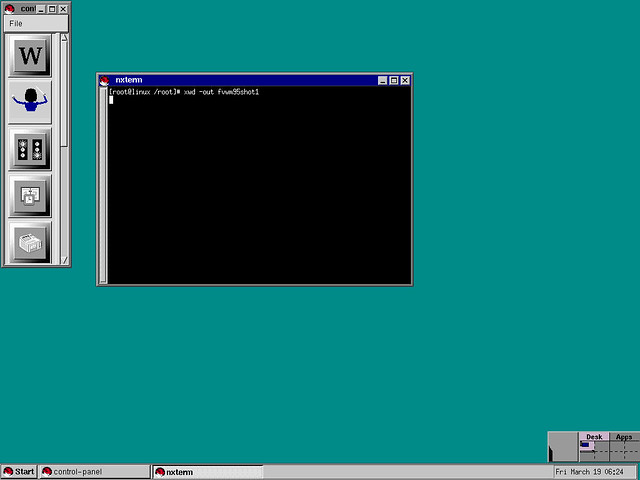
Today things are really quite different. I was thinking about this sheer change in desktop quality, and felt an incredible urge to share the reasons why I love my desktop and love the integration. All of this is based on a default [Ubuntu 10.04 Maverick Meerkat](https://www.ubuntu.com/desktop) installation with Unity enabled as the desktop. You can switch on Unity with:
sudo apt-get update
sudo apt-get install unity
…and then at the login screen select *Ubuntu Netbook* from the list of available sessions. Rock and roll!
### Unity
I am really digging Unity. While still quite new and still maturing, I find it’s current form really sleek and easy to use. I like the design and the structure of how I get at my apps, my data, and control what is going on on my desktop:

One element of Unity that I really enjoy is the theme and the new Ubuntu font. It really gives the desktop a subtle sheen, and the dark theme makes it look slick and sexy.
One key feature of Unity that is going to become an increasingly big deal is the *Places API*:
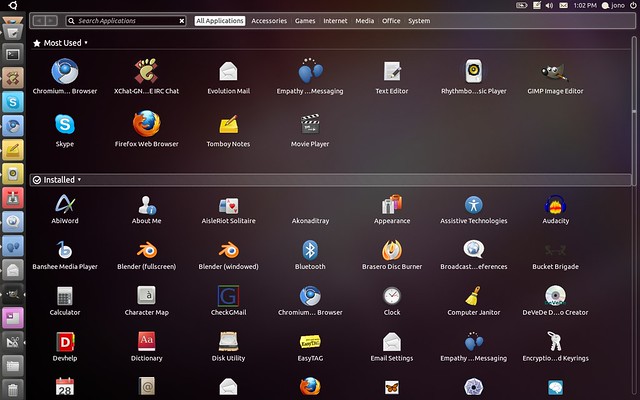
Unity provides a consistent user interface for displaying different types of content (such as files and applications), but this extendable. Neil Patel who is one of the lead Unity hackers has already created an example of this work which plugs YouTube in, and it is great to see this kind of content embedded into the experience. I can’t wait to see how application authors will use this technology to provide better access to content, all using this consistent user interface.
As many of you know, Unity will be switched on by default in Ubuntu 11.04, and the performance and accessibility issues are currently being tended to. For more details [see this blog post](https://archivedblog.jonobacon.com/2010/10/31/unity-some-further-clarification-points/).
### Microblogging
Microblogging has become all the craze over the last few years, and Twitter, Facebook, identi.ca, and others have all made the micro-blogging experience simple and useful. I love the micro-blogging support built right into my desktop, firstly with Gwibber:

Gwibber is an awesome micro-blogging tool. It provides simple and quick access to see all of my accounts together, helps me see a standard set of searches that I care about, and lets me tweet once and have the message go to all of my accounts.
In addition to this I love how I can tweet right from my desktop with the Me Menu:
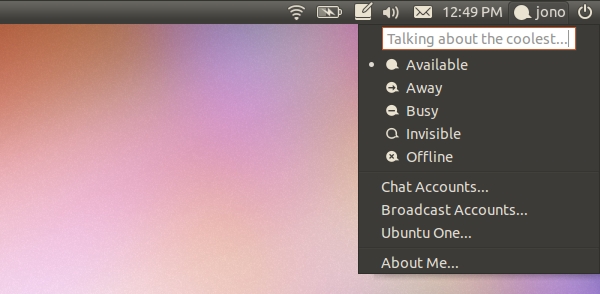
This is how it should be: when the thought or inspiration takes me, I always have a quick interface for tweeting, irrespective of what I am doing, because it is built into the shell of the desktop. Rock and roll!
### Indicators
Speaking of indicators, I use the indicators *all the time*. In particular, I find the Messaging Menu really useful:
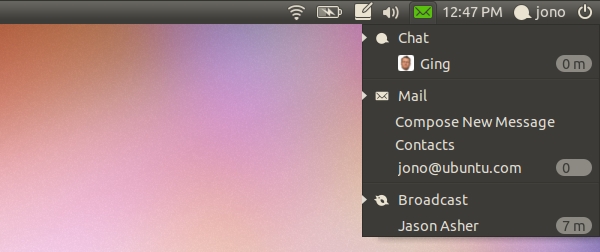
It is incredibly handy having all the things that need my attention to appear in the same place, all neatly packed into that menu, and when it lights up I know I need to check it.
In addition to this, the recent addition of the Sound Menu enhancements are awesome:
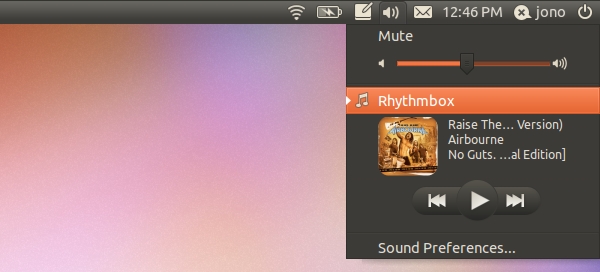
Like many, I put music on during the day when I work, and typically the only things I need to with it are use the transport controls (e.g. to fast forward, replay, or pause a song), or more often than not, see which artist/album is currently playing if I have it on shuffle. No longer do I need to keep showing the Rhythmbox window to do this; it is right there in my sound menu. Really handy. 🙂
### Rhythmbox
Speaking of Rhythmbox, I love it to bits:
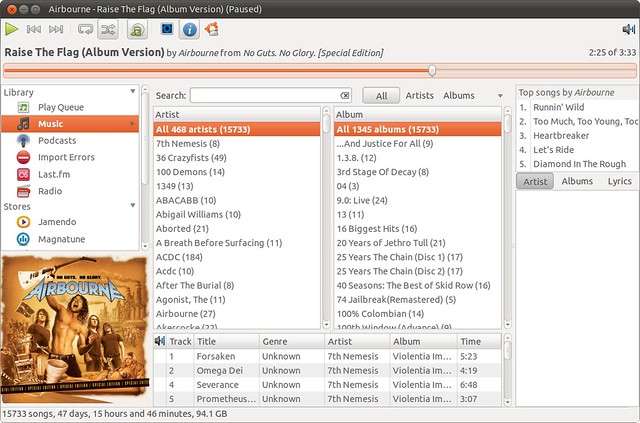
Rhythmbox lets me manage my music collection easily, and has lots of nice features to really enjoy the music I listen to.
Sure, we are moving to Banshee in 11.04, but I love that too – I think we have such great choice in the media player world. One thing I really love about Rhythmbox is that I can enable the DAAP plugin and I can control and listen to my songs via my Playstation 3 and hear my tunes on our home theater system. Much better than laptop speakers, and a doddle to do this. 🙂
### Evolution
Like many of you, email is at the center of my life, and I find Evolution serves me really well:
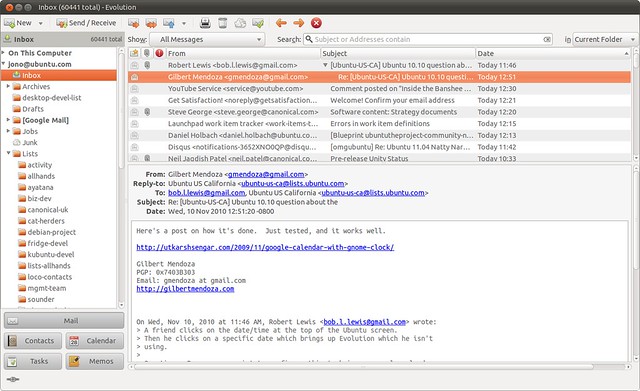
A lot of people talk a lot of smack about Evolution, but I think the Evo team have done a great job. I get a *lot* of mail, and Evolution helps me set up filters to prioritize how I see, respond to, and manage my mail. What’s more, it integrates nicely into my desktop, and integrates perfectly in the Messaging Menu.
### Empathy
Instant messaging is a common thing I use my desktop for, and again this is all perfectly handled with Empathy:
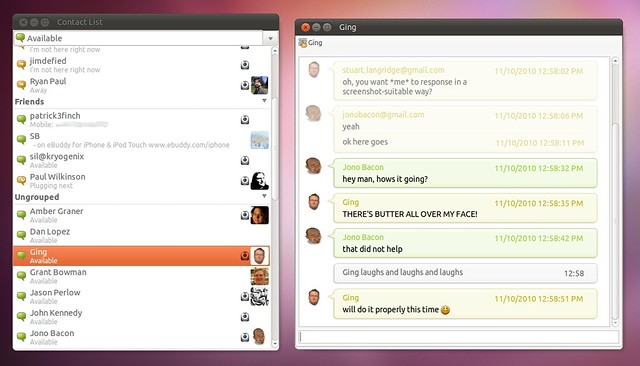
I love how Empathy brings all my messaging accounts together and provides the same interface for interacting with my friends. It looks beautiful, works smoothly, and is a pleasurable experience.
### Getting More Software
I have also been delighted to see how the experience of getting more software has been refined with the Ubuntu Software Center:
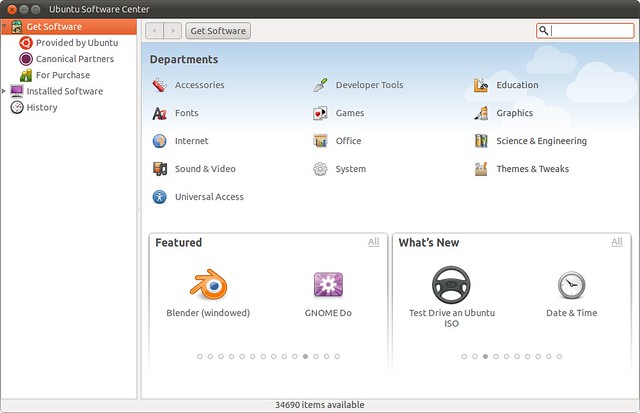
We have always had this incredible catalog of software available for Ubuntu, but now it is finally becoming more accessible for new users. This will also becomes infinitely more useful when ratings and reviews land in the Ubuntu 10.10 release – this will help all the really great software bubble to the surface!
### In Conclusion
In addition to my Ubuntu machines, I have a Windows 7 machine that powers my home studio. When I compare and contrast my Ubuntu installation with Windows 7, it feels like Ubuntu is much better attuned to what most users want – awesome web browsing, email, communications, media playback and production, and a consistent, attractive experience.
I think we should all be hugely proud of how far we have come with the Linux desktop, and I am intensely proud of how slick and integrated Ubuntu is, and the impact the design team has had on the experience. I would love to hear why others love their desktops too, do share!

A Little More OpenRespect

Another quick update. The [website](https://www.openrespect.org) now has a little more content, I have started adding some [support resources for dealing with conflict and disrespect](https://openrespect.org/guides/), and you can help spread the word that OpenRespect is a good thing with some [rather nice buttons](https://openrespect.org/share/).

Announcing openrespect.org
Recently I [blogged about some concerns that I have had](https://archivedblog.jonobacon.com/2010/11/05/making-our-world-more-respectful/) about increasing disrespect in the Open Source, Free Software, and Free Culture communities. My blog entry shared some of the work I started on an *OpenRespect Declaration*, but I wasn’t sure if I should publish it.
I did some thinking on this, and reviewed some of the fantastic comments on my blog, and I decided to go ahead and [launch openrespect.org](https://openrespect.org). There I have listed the declaration with a few extra points about:
* the importance of honesty (thanks Jef Spaleta for the suggestion)
* the importance of remembering that people pour their heart and soul into their work
The site is pretty simple, and pretty minimal, so don’t expect a rip-roaring experience there, but it gets over the most important point – the *OpenRespect Declaration*.
In my spare time I plan on adding some additional materials there — tips and suggestions about keeping conversation respectful, and how to deal with disrespectful folks — so if anyone would like to propose some content, just drop me an email.
Before I wrap, I just want to offer a few notes to bear in mind regarding openrespect.org:
* this is not specific to the communities I am part of, but designed to apply to any community.
* this is not a United Nations declaration, it is not necessarily representative of what the entire Open Source and Free Software community, it is representative of what *I* feel is a fair set of guidelines around respect. Don’t like it? No worries, ignore it!
* I don’t plan on turning openrespect.org into a mission; I am too busy and pre-occupied with other things, but I felt I needed to do *something* – this is a start, and I hope can grow the site to be more useful as time goes on.
* this won’t solve all the problems, but it is a start, and if helps *just one* conversation be more respectful, it was was worth the minimal amount of effort that I put into kicking this off. 🙂
If you think openrespect.org is a good idea and would like to help, I would just encourage you to encourage people to read it, encourage your projects to be inspired by it, and otherwise spread the word. I would also like to encourage all of you who think the *OpenRespect Declaration* makes sense to blog it, dent it, tweet it etc to spread awareness.
Thanks, everyone for providing constructive feedback on the idea. 🙂

Making Our World More Respectful
Something has been bothering me a little recently, and I have been trying to think about the best way of solving it. This is a problem that is not specific to Ubuntu or my world, but one that I believe affects many, many projects. I am not sure that there is a crisp solution to this problem, and some of you won’t even see it as a problem in the first place, but let me explain…
I am getting a little tired of the bickering in Open Source. Don’t get me wrong, I love full, frank and colorful discourse and debate, and I believe that innovation thrives on the exchange of ideas and different perspectives. Unfortunately, it seems that respectful debate and discussion has been increasingly replaced with rudeness, abrupt perspectives that are ill-researched, and the kind of behavior that people may exhibit online but would never exhibit if the same conversation happened in real life. To be clear: this is not about people who disagree with me or the projects I am associated with, there are many people who offer disagreements and alternative perspectives politely, constructively and are willing to engage in a discussion — this concern instead reflects those who are more interested in angry rhetoric rather that constructive, informed debate.
What worries me is that I believe that this angry rhetoric is harmful to our community. Let me provide an example of where debate works well. Scott Kitterman in the Kubuntu community has often expressed concerns about aspects of the Ubuntu community, but Scott has always expressed his concerns with (a) politeness (b) respect, and his debate has always been well-research and informed and he has always been willing to listen to other viewpoints. Another great example is Emmett Hickory; a contributor who has exhibited all these same attributes as Scott. While we don’t always see eye to eye, I think Scott and Emmett are tremendously valuable participants in our community; they bring valuable perspectives, are not afraid to push back, but always place respect and accuracy at the center of their discourse, and they always have the best interests of the project at heart. Of course, there are many other similar examples of great debate elsewhere.
What worries me instead are the folks who engage in angry discourse that is often based on mis-information, or worse, an immediate assumption that there is malice or ill-will driving the person they disagree with. When did we become so argumentative and mis-trusting? One of the things that attracted me to Open Source when I got involved was the addictive feeling of being surrounded by a community of people with the *best* intentions in the world. I would meet people who would open their homes up to strangers for Linux User Group meetings, those who would contribute to projects because they like the idea of their work helping others, and within this ecosystem there was an assumption that the organizations who thrive in it have good intentions too. No-one ever questioned Red Hat’s ambitions, or Caldera’s, or Mandrake’s, no-one batted an eye-lid at VA, the humble Linux Emporium, or Loki games.
Today it seems our community is more suspicious than it was, and while there have always been folks on the fringes who assume mal-intent first and engage in rowdy arguments, it worries me that we are seeing more folks like this. What worries me is that this behavior (a) makes the Open Source community look like a group of petulant teenagers, and (b) more worryingly, discourages others from joining our community to help us bring freedom to others because frankly, they don’t want to wake up to a fight every day online.
I feel like there must be a solution to this problem. This is not a problem of people having different viewpoints, and I am sure some folks in the comments will provide some sweet irony and accuse me of trying to deafen those who disagree with me, but those of you who know me know that I love to have a good debate, and I am never afraid to shake hands and say “let’s just agree to disagree” or calmly not participate.
Over the last two or three weeks I have been kicking around the idea of putting together some kind of statement, inspired by the Ubuntu Code Of Conduct, that many of us could put our names behind. In fact, I registered `openrespect.org` and started putting together a draft. I shared this idea with Stefano Zacchiroli the current Debian Project Leader and Jared K. Smith the current Fedora Project Leader, two guys who I have unending levels of respect in their viewpoints. They thought it was a pretty good idea to have a statement, and were happy to participate.
A few nights ago I started writing something up, and it made me think hard about how multi-faceted this challenge is. This is not just about inspiring our community to engage in informed, polite, and respectful debate, but I also believe that it is also about accepting our differences and moving on. As an example, Scott Kitterman has communicated some of his disagreements to certain policies with me, but when he knows that I am abreast of his viewpoint, and I have sufficiently communicated my viewpoint to him, we agree to disagree and move on without repeatedly nipping at each other about the topic. I believe this is a core attribute of respect: my friend Dave has some pretty out-there views on politics, but I don’t poke him every day about them – we know where we stand, and we move on.
There were many of these small considerations as I worked on the text, and I felt less and less comfortable about writing it. So, I thought what might be better is to share what I have so far, and if others feel it might be worth pursuing a statement such as this, I might keep working on it, and maybe `openrespect.org` could be useful.
This is it so far:
> All over the world there are many people who are united in creating software, content, and culture that is freely available for others to share, enjoy and enrich their lives. Together we believe that freedom is good. We believe it helps people do good things, make better choices, and lead safer and more secure lives. Together we are a community united by this belief.
> Our community is vast. It spreads beyond our streets and towns, traverses countries and borders, and is wider than our groups and projects. Many of us speak different languages, make different choices, and engage in this software, content, and culture in different ways, but what unites us is the same core belief that freedom, openness and choice is good for people. Our methods and opinions may differ, and our definitions of what constitutes freedom and openness may vary, but this united belief in freedom and openness remains the same.
> Irrespective of these methods, opinions, definitions, and differences, respect should always be at the foundation of how we engage. When we place respect at the center of our interactions, we enrich our lives, discover new ways of thinking, and expand our horizons with new ideas and experiences. When we remove this respect, our conversations suffer, which in turn makes our community suffer, and this ultimately risks our ability to bring our message of freedom and openness to others.
> Respect is not just civility in communication, but also respecting other people for making their own choices, even if you disagree with them.
> Respect is sharing opinions so a mutual understanding of principles is understood, but then giving others the freedom to pursue their own paths without fear of persecution by those who have made different decisions or have different definitions of freedom and openness.
> Respect is engaging in open and polite debate with the goal of enriching each others perspectives, not for the purpose of proving each wrong.
> We are all on the same side, we just sometimes draw the lines differently. Respect is understanding these differences but moving together as community, united by the core goal of freedom and openness.
The caveat is that this was about 15mins of work, so I appreciate it is not perfect.
I believe that the Open Source and Free Software community is the greatest community in the world, and it is populated by the greatest people in the world. Over the years I have seen incredible levels of generosity shared in our community, and a real feeling of family and looking after each other. Some of the people I would most vehemently disagree with, I consider some of my greatest friends, and many others are the same. I believe this openness to ideas and sharing perspectives is valuable, but I do think we need to confront some of the disrespectful discourse that is happening.
Any ideas on how we can do this?
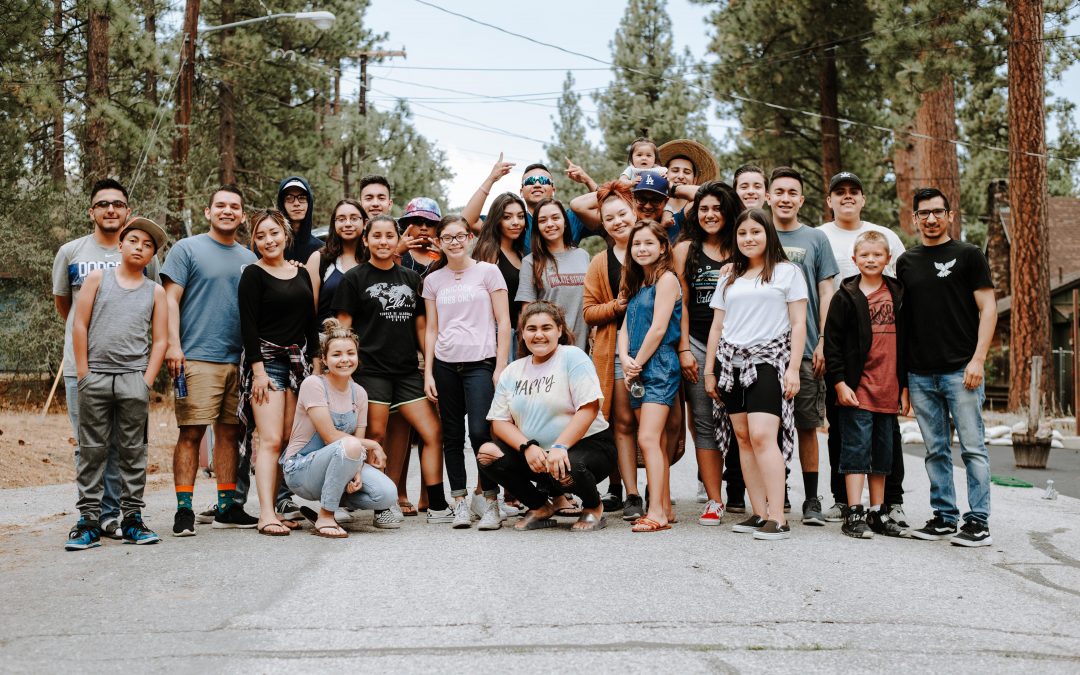
Over 5% of Ubuntu Members are women. Rock and Roll.

I am delighted to see that [over 5% of Ubuntu Members are women](https://princessleia.com/journal/?p=3651). That is 5% of active contributors who have performed significant and sustained contributions are women. For the full scoop, read [Lyz’s post](https://princessleia.com/journal/?p=3651).
I just want to offer my congratulations to the awesome [Ubuntu Women](https://ubuntu-women.org/) team for all their hard work. It was also great to see the team’s continued hard work and participation at the most recent *Ubuntu Developer Summit* in Orlando, Florida.
*Diversity* is something we always strive for in Ubuntu, both in terms of welcoming all people of gender, color, background, or (dis)ability, as well as welcoming a diverse range of skills that bring personal satisfaction to contributors as well as value to Ubuntu and Free Software, be it code, packaging, documentation, translations, advocacy, or anything else. Diversity is never a *solved problem*, it is always a state that we strive for in which anyone with any skill from any demographic feels welcome, empowered, and inspired by Ubuntu and our ethos.
I just want to offer major props to Elizabeth Krumbach, Melissa Draper, Amber Graner, Laura Czajkowski, Leigh Honeywell, Penelope Stowe, Mackenzie Morgan, Valorie Zimmerman, and the many others who have supported and helped *Ubuntu Women* to help improve how accessible and welcoming Ubuntu is to women.

Fedora 14 Released
I just wanted to say a quick congratulations to our friends in the [Fedora Community](https://fedoraproject.org/) for their work on [Fedora 14](https://fedoraproject.org/en/get-fedora) which was released today! The Fedora team have been putting out some great releases, so congrats to the community for all their hard work! Time for a few glasses of something cold and frothy to celebrate!
You can [download Fedora 14 here](https://fedoraproject.org/en/get-fedora).
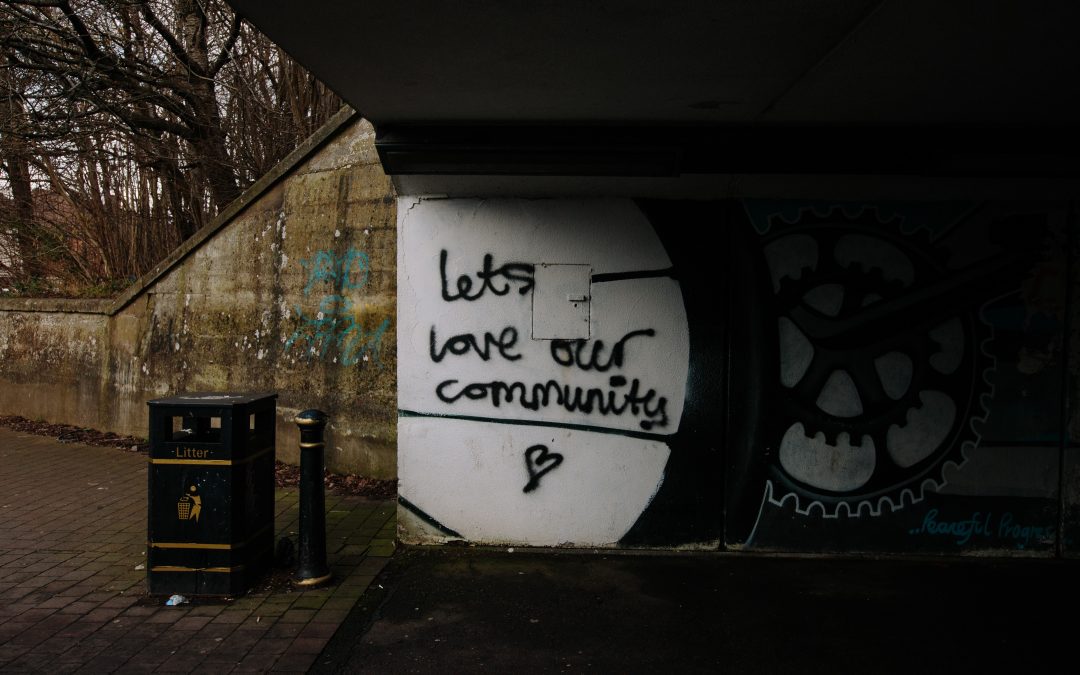
Unity: Some Further Clarification Points
After hectic few weeks on the road I am now back in sunny California, and we had a wonderful Ubuntu Developer Summit in Orlando, Florida. Thanks to everyone who made the event such a success. It was so great to meet so many old friends and to meet the may new friends who experienced UDS for the first time. Looking forward to working with you in the Natty cycle!
At the start of UDS Mark made the announcement that on hardware that supports it, Unity will be shipped as the default environment for Ubuntu 11.04. Since the announcement there has been a lot of commentary and articles about the decision, mostly of the view of “*if you folks can pull this off, this will be awesome*”. Thanks to everyone for the confidence and support in our community and in Canonical. I know we can make this rock, but we are going to need to pull together to make it happen. Throughout this cycle we are really uniting as a community, and this feeling was electrifying at UDS; there was a real shared sense of opportunity, and I for one am ready to dig my heels in and make this happen. 🙂
By and large the commentary since the announcement has reflected the facts, but some articles have got things a little skewed. My view here is simple: I think everyone should be welcome to have their own view on Unity, either supportive or cynical, under the premise that the basis of the discussion reflects the facts and not misinformation.
So, I just wanted to clarify some of the key points regarding the transition to Unity by default in Ubuntu 11.04 to make sure these facts are clearly communicated:
* **Ubuntu is not ditching/forking GNOME** – Unity is a shell for GNOME, but not GNOME shell. Ubuntu is still a GNOME platform. 11.04 will ship all the components required for GNOME application authors to have their software run out of the box in Ubuntu, and we will still ship all the GNOME apps you know and love in Ubuntu 11.04. The only change is that Unity will be the default shell. Likewise, this is not a fork: we are not diverging away from GNOME, just producing a different shell in much the same way others have (e.g. Meego). It is just a different porthole looking at the awesome GNOME platform.
* **Unity is the 3D experience, Classic GNOME is the 2D interface** – if your graphics hardware cannot sufficiently run Unity, Ubuntu will present the 2D experience which is the two-panel GNOME desktop we currently ship, complete with all the Ayatana improvements such as application indicators, global menu, system indicators etc.
* **Accessibility is a top priority** – currently Unity has rather poor accessibility support (read: basically non-existent) and accessibility is a core ethos in Ubuntu. As such, Luke Yelavich has been assigned to the DX team (the folks who code Unity) to work on accessibility support in Unity, and he will be supported by Gary Lasker. In addition to this, we had a great set of meetings at UDS with the [Ubuntu Accessibility community team](https://wiki.ubuntu.com/Accessibility) and they are synced up with Luke to help support this work with testing, bug triage, and outreach. Great accessibility is a requirement for Unity if it is to ship in 11.04: let’s pull together to make this happen.
* **Performance is being resolved; porting to Compiz** – some of you have experienced poor Unity performance on certain netbooks due to their graphics cards. This has been identified is a core issue to resolve and it is largely due to performance issues in clutter and mutter (the graphics backend for Unity). To resolve this Jason has started work on a Compiz port, and early results (i.e. less than a week of hacking!) have already seen significant performance improvements. He demoed it to some folks on hardware that received the most performance bug reports, and the performance was incredible snappy and slick; it exhibited the kind of responsiveness and animation that you should expect from a high quality experience.
* **Quality is a top priority** – Neil and the rest of the Unity team worked off their socks to get Unity read for the 10.10 netbook edition, and despite their best efforts, there were some quality issues highlighted and bug reported. The team believes they have bug reports for the majority of issues, and this cycle they are spending most of their time focusing on resolving these quality issues so as to deliver a top-notch Unity experience. In this cycle I am also going to leading my team to help build community support and contributions around quality too, particularly around highlighting areas in which the community can help resolve and fix issues.
* **GNOME Shell is supported in Ubuntu** – although we are not shipping GNOME Shell on the disc and as the default environment for Ubuntu, we believe that users should be able to get a top-notch GNOME Shell experience in Ubuntu. With Ubuntu Software Center providing one-click access to software, getting a GNOME Shell experience up and running should only be a click away. To be clear, Seb and co who work on the Canonical desktop team have limited resources to assist with this effort, but they are keen to ensure we have a great GNOME Shell experience and are happy to work with the community to make this happen. Want to make sure you get a rocking GNOME Shell in Ubuntu? [Mail me](mailto:jonoATubuntuDOTcom) and let’s see what we can do to make this happen. 🙂
* **Unity is an Open Source project** – Unity is Free Software and a full Open Source project in which we are going to rely on the community to help make this rock. We are looking for help with design, documentation, translations, development, and more! Curious to see how you can help? See [this page](https://unity.ubuntu.com/getinvolved/) for more!
I think those are the main points for clarification. Many thanks for all those who have been helping to ensure the correct information and facts have been clarified in the various commentary happening around the tubes.
Thanks also to everyone who is ready to roll their sleeves up and make this effort rock. I am hugely excited for the Ubuntu 11.04 release, and this is going to be a fun cycle as we all circle around Unity and bring our different skills and diversity of experience and make it the most innovative Ubuntu release yet. Start your engines…
**Do you have more questions? Are there some things I have not covered here or want more detail on? Be sure to join my [live video Q+A session](https://www.ustream.tv/channel/at-home-with-jono-bacon) in which I will answer all your questions! Join us on Wed 3rd Nov 2010 at 11am Pacific / 2pm Eastern / 6pm UTC at [this location](https://www.ustream.tv/channel/at-home-with-jono-bacon) to get involved. See you then!**

Ubuntu 11.04 To Ship Unity
Mark just announced at the Ubuntu Developer Summit in Orlando that we will be shipping the Unity environment in the Ubuntu desktop edition. Unity is the environment we shipped on the Ubuntu Netbook Edition for the first time in Ubuntu 10.10 Maverick Meerkat, and users and OEMs have been enjoying the experience. It is an environment that is inspired by great design, touch, and a strong and integrated experience.
I think this is a fantastic opportunity for Free Software, and this is going to be a busy cycle. We have a lot of work to do, and we know that quality is a firm focus for this release, and we have identified a solid set of issues we need to focus on and resolve, but I know the final product will be something that we will all be proud of. Another key focus is performance; we have already started porting Unity from mutter to Compiz and the initial work is much faster, most notably on hardware that has traditionally had the most trouble from bug reports. Quality meets design meets performance. Together as a community we can make this rock.
There is going to be some questions about this decision in relation to GNOME. I want to make something crystal clear: **Ubuntu is a GNOME distribution**, we ship the GNOME stack, we will continue to ship GNOME apps, and we optimize Ubuntu for GNOME. The only difference is that Unity is a different shell for GNOME, but we continue to support the latest GNOME Shell development work in the Ubuntu archives.
If anyone has any questions, I will be running around the Ubuntu Developer Summit like a headless chicken, so feel free to grab me here if you have any questions, and I will get online to respond to queries when I get time away from sessions.
Thanks, folks.

Maverick Meerkat And Nightmares By Design: Finally Unleashed
Over the last two days two projects near and dear to my heart have issued important new releases. I just wanted to cover them both here in one solid shot of awesome, with the goal of encouraging your lovely people to go and download and enjoy both.
## Ubuntu 10.10 Maverick Meerkat Released!

At 10am UTC on the 10th of the 10th month in 2010 we [unleashed the Maverick Meerkat into the wild](https://www.ubuntu.com). It has been a long and busy cycle, but like many other members of the Ubuntu family, I am hugely proud of this release. I think Maverick is yet another step forward in which Ubuntu seats itself as a real contender to provide an awesome, simple, and importantly…Free Software…computing experience.
There are a number of things that I have been excited about in Maverick. We have seen the introduction of Unity in the netbook edition, which I have started using on my desktop, the sound indicator saw improvements, numerous Ubuntu Software Center changes, a raft of general software updates, a new GNOME, private/public cloud improvements, Ubuntu One additions (such as music streaming) and much more. I am tremendously proud of all the hard work that has gone into this release in the community and at Canonical. I just want to offer a particular shout-out to some of the lesser known folks who have made this release rock – the translators, testers, docs writers, release management folks, and more. Everyone has put their brick in the wall to bring Ubuntu to millions of users around the world.
**[Go and find out more about Ubuntu 10.10 Maverick Meerkat here](https://www.ubuntu.com)**
## New Severed Fifth ‘Nightmares By Design’ Album Released!

A day after the Ubuntu release I announced the availability of the new album in my Creative Commons metal project [Severed Fifth](https://www.severedfifth.com/). The album is called [Nightmares By Design](https://www.severedfifth.com/releases/) and you can read the announcement of the new album [here](https://www.severedfifth.com/2010/10/11/nightmares-by-design-is-released/) and download it from [here](https://www.severedfifth.com/releases/).
The album features eleven tracks, is just over 54mins long, and is available under a [Creative Commons Attribution-ShareAlike](https://creativecommons.org/licenses/by-sa/2.0/) license. I would like to encourage you all to download it, enjoy it, and share it with your friends. This album is way more musical, more accessible, and I think an all-round better album than the first release; I am really proud of it. 🙂
